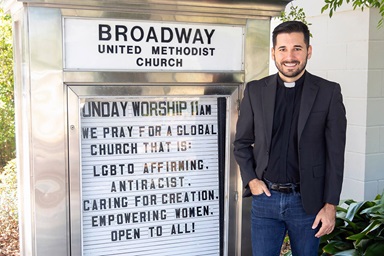Key points:
- General Conference delegates’ decision to change the church’s teaching on marriage, for the first time approving same-sex couples who wed, sparked a protest from some African delegates.
- As the Africans held their protest outside the Charlotte Convention Center, supporters of the decision gathered a short distance away for celebration.
- Bishop John Wesley Yohanna of Nigeria joined in the Africans’ protest.
African delegates and one African bishop joined in a protest after General Conference delegates voted to revise the church’s position on marriage, for the first time approving same-sex couples who choose to wed.
At the opposite end of a plaza outside the Charlotte Convention Center, members of the Queer Delegate Caucus and allies celebrated the same decision.
This General Conference has embraced full LGBTQ inclusion through a number of votes, including on May 2 affirming “marriage as a sacred, lifelong covenant that brings two people of faith (adult man and adult woman of consenting age or two adult persons of consenting age) into a union of one another and into deeper relationship with God and the religious community.”
After the marriage language decision, about 65 Africans, with a smattering of others, sang hymns and prayed together, while also making clear their view that the Bible does not sanction same-sex marriage and The United Methodist Church shouldn’t either.
“We do not believe we know better than the Bible,” said the Rev. Jerry Kulah, a General Conference delegate from Liberia, coordinator of the traditionalist Africa Initiative and leader at the rally.
Virginia Bambur, a delegate from the Central Nigeria Conference, also disapproved of the General Conference action.
“I’m not happy about it,” she told UM News. “You cannot change the word of God.”
Bishop John Wesley Yohanna of Nigeria joined the protest and criticized the General Conference’s more expansive language on marriage.
“Marriage is between a man and a woman, period,” he told UM News.

Most African United Methodist bishops have expressed strong support for the traditional definition of marriage, while also saying they are committed to The United Methodist Church, provided church policies can be adapted to the African context.
But Yohanna has long made clear that he would have to leave the denomination if it in any way endorsed same-sex marriage.
He said after the protest that he is nearing the end of his episcopal term and wants to stay long enough to help bring reconciliation among United Methodist factions in Nigeria. He said he was still weighing whether he would eventually join another denomination.
Yohanna predicted that the new language on marriage will come at a cost to United Methodism.
“I’m very sure this will affect the membership of the church in Africa,” he said.
Kulah echoed that while speaking at the protest.
“We return to Africa with important decisions to make regarding the future,” he said.
Kulah also said that more than 70 African delegates never made it to General Conference and blamed the Commission on General Conference for lack of communication and lateness in sending letters of invitation necessary to get a visa.
“It felt as if we were not valued or wanted,” Kulah said.
This General Conference’s credentials committee has reported on absentee delegates but without specifying the number of Africans. The committee’s chair also has noted the challenge the staff faced in verifying properly elected delegates from Africa.
Maybe 30 yards from the Africans’ protest, supporters of the change on marriage language gathered, including Bishop Karen Oliveto.
Oliveto, a lesbian whose 2016 election as bishop by Western Jurisdictional Conference delegates caused major controversy in the denomination, spoke to the crowd.
“You are the love child of God,” she said. “The church looks a lot more like heaven today.”
Justice Mitchell, a graduate student studying for a divinity degree, had driven to Charlotte from Durham, North Carolina, the morning of May 1, after finishing finals the previous day.
Subscribe to our
e-newsletter
“I’ve been a Methodist my whole life, and I’ve been in the ordination track for the past three or four years,” he said. “A lot of the stuff that we’re voting on has very huge impacts for my future in the next three or four years.”
Katelyn MacDonald, another observer from Durham, said she was “excited that the church structurally is moving in a more inclusive direction.”
“We’re trying to get our church polity and structures to catch up to what God has already been doing in the world,” she said.
Jan Nelson, a lay delegate from the Oregon-Idaho Conference, said her life has started to revolve around the church more since her retirement.
She said that this General Conference’s decisions on LGBTQ inclusion are a big positive.
“This means that this fight can be set aside and we can keep working for eliminating poverty and eliminating racism and all the other things that the church needs to be about,” she said.
Hodges and Patterson are writers for United Methodist News. Contact them at 615-742-5470 or [email protected]. To read more United Methodist news, subscribe to the free Daily or Weekly Digests.





